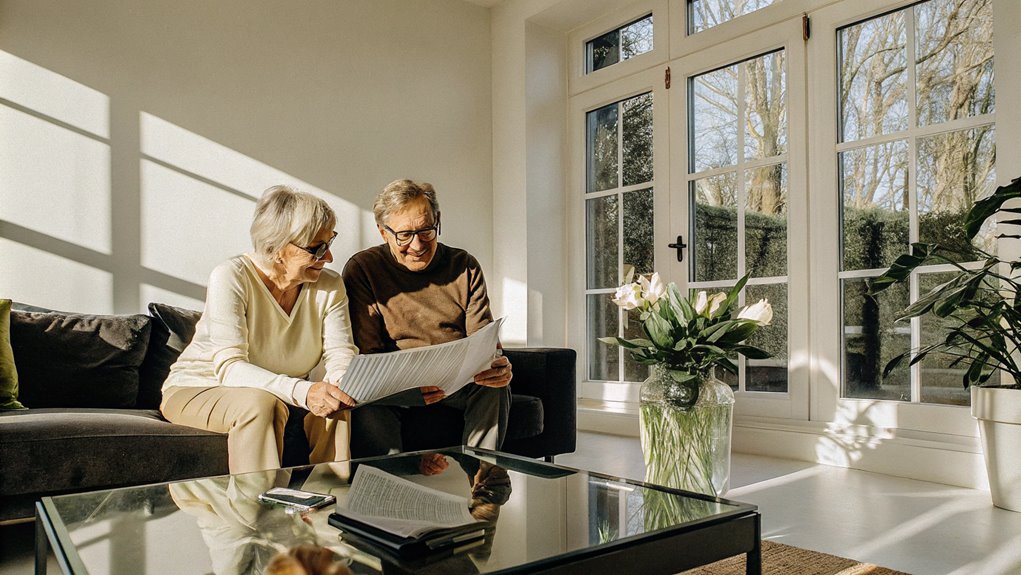Thinking about your retirement years? A reverse mortgage lets you use money from your home while still living there. If you're at least 62 years old, this might help you. You can get money from your home's worth without paying it back each month. You pick how to get the money – all at once, each month, or when you need it. This can help pay for doctor visits, fix your house, or buy food and things you need. You still get your Social Security checks and Medicare help. The best part? You keep your home! You only need to pay back the loan if you move out, sell your home, or die. Take time to learn how it works so you can make a good choice for your future.
Ready to start building equity in your own Michigan home? Get your personalized home loan quote today.
Understanding Reverse Mortgage Basics

A reverse mortgage helps older homeowners use their home's value as cash. If you're 62 or older, you can get money from your home and still live there. You won't need to pay the bank each month.
You only pay back the loan when you move out, sell your home, or die. You can get your money all at once, every month, or keep it ready when you need it. How much money you get depends on how old you are, what your home is worth, and bank rates.
You must still take care of your home. You need to pay your taxes and keep insurance on the house. The bank will add fees to what you owe over time.
Before you can get this loan, you must talk to a housing expert who'll teach you more about it.
Michigan residents, unlock the door to your new home. Request your home loan quote from Treeside Financial today.
Eligibility Requirements
You can get a reverse mortgage if you follow these simple rules:
You must be 62 or older to start. The house must be where you live most of the time. It can be a regular house, a special condo, or a mobile home that meets basic rules.
You need to show you can pay for things like taxes and home care.
You must also keep up with home bills and fix things that break.
Age and Property Requirements
Getting a reverse mortgage means you need to check a few important boxes first. You must be 62 or older, and you need to own your home or have paid off most of it.
The home must be where you live most of the time. It has to be safe and in good shape.
You can get a reverse mortgage if you have:
- A single-family home
- A building with up to four homes in it
- Some mobile homes that meet special rules
- A condo that the FHA says is OK
You need to take good care of your home. You must pay your property taxes on time. You also need to have insurance on your home.
If you do these things, you can keep your reverse mortgage.
Financial Qualifications for Approval
Getting a reverse mortgage means showing you can handle money well.
You need to prove you can pay for:
- Your property tax bills
- House insurance
- Home fixes
Your bank will look at your money to make sure you can pay these costs. They check if you:
- Have enough money coming in
- Have savings
- Pay your bills on time
You mustn't owe money to the government.
If you still have a home loan, the reverse mortgage will pay it off.
Your credit doesn't need to be perfect.
But the bank will check if you pay your bills.
You must talk to a housing expert first.
They'll help you understand how a reverse mortgage works and if it's right for you.
This talk is required by law to keep you safe.
Benefits for Senior Homeowners

A reverse mortgage lets you use money from your home while still living there.
You won't need to sell your house or make payments each month. You can get all the money at once to help with big costs.
Or, you can get small amounts of money each month to help pay your bills. This extra money can make life easier as you grow older in your home.
Immediate Access to Equity
Your home has value locked inside it. A reverse mortgage lets you use this value without having to sell your home. You can get the money in one big payment, small monthly payments, or keep it ready to use when you need it.
You don't have to pay the loan back each month like other loans. You can use the money for anything you want. Maybe you need to pay doctor bills, fix up your house, or have extra money for daily life.
If you pick the ready-to-use option, it grows bigger over time. This means you'll have more money to use as you get older.
Monthly Income During Retirement
Getting extra money each month from your home can help you live better in retirement. A reverse mortgage lets you turn your home into steady cash that shows up in your bank each month. You can use this money for food, doctor visits, or anything else you need.
The good news is:
- Money comes to you each month like clockwork
- You get paid even if your house is worth less later
- You can spend the money any way you want
- You don't have to pay the bank each month
- You can ask for more or less money when you need to
This monthly money helps when prices go up but your other income stays the same. Plus, it won't hurt the money you get from Social Security or Medicare.
As long as you live in your home, the money keeps coming.
Financial Planning Advantages
Getting money from your home can make life easier when you retire. A reverse mortgage lets you get cash without selling your stocks when prices are low. You can also wait to get bigger Social Security checks by using this money first.
Simple Benefits:
- You don't pay taxes on the money you get
- You can keep your savings longer
- You choose how to share money with your family
One good thing is that you can set up a credit line that grows each year. This helps when things cost more over time. The best part is that you can still use this credit line even if your house loses some value.
| What You Get | How It Helps | Why It's Good |
|---|---|---|
| No Tax to Pay | Keep More Money | Pay Less to IRS |
| Use Home Value | Save Other Money | Keep Investments Safe |
| Family Choices | Plan Ahead | Help Kids Later |
Common Misconceptions

Many people get confused about reverse mortgages. Let's clear up some wrong ideas.
A reverse mortgage is a way to use your home to get money. Many folks worry about what it means for them and their family.
The truth is:
- You still own your home
- Your family can keep the home after you die
- Your wife or husband can stay in the home
- You can use this loan even if you have good money
- You can sell your home when you want
These loans work better than many people think. Old stories about them are often wrong. Learning the facts helps you know if this is right for you.
Getting the real facts can help you pick what's best for your money and your family.
Costs and Fees
Getting a reverse mortgage means paying some fees up front.
Let's look at what you need to pay.
You will have to pay:
- A fee to start the loan
- Insurance costs
- Someone to check your home's worth
Most costs can be part of your loan. This means you won't need cash right away.
But it will lower how much money you can get from your home.
Simple Fee Guide:
- Starting the loan: 2% of first $200,000
- First insurance payment: 2% of home value
- Yearly insurance: 0.5% of loan amount
- Home check: $300-$500
Talk to many lenders.
Look at all their costs.
Pick the one that gives you the best deal.
This will help you save money and get more from your home.
Home Equity Protection

Your home equity is important to protect when you get a reverse mortgage. These loans have rules that help keep your money safe. You won't have to pay back more than your home is worth when the loan ends.
The loan has rules to keep you safe:
- You keep all your other money if the loan gets bigger than your home's value
- Your loan is safe even if your bank has problems
- You must talk to a helper who explains how the loan works
- You need to take good care of your home
- Each year, someone checks if you can still pay for taxes and home costs
The home stays yours, and these rules help protect your money as long as you have the loan.
Next Steps to Consider
Let's talk about what you can do next with your reverse mortgage.
Talk to a friendly advisor who helps people like you understand these loans. They work with HUD, which is a group that makes sure you get good advice.
Get your papers ready. You'll need:
- Papers that show your money coming in
- Papers about your house taxes
- Papers about your house insurance
Look at many banks to find the best deal. Some loans have rates that change, and some stay the same. Pick the one that works best for you.
Tell your family about your plans. Your choice may affect them too.







